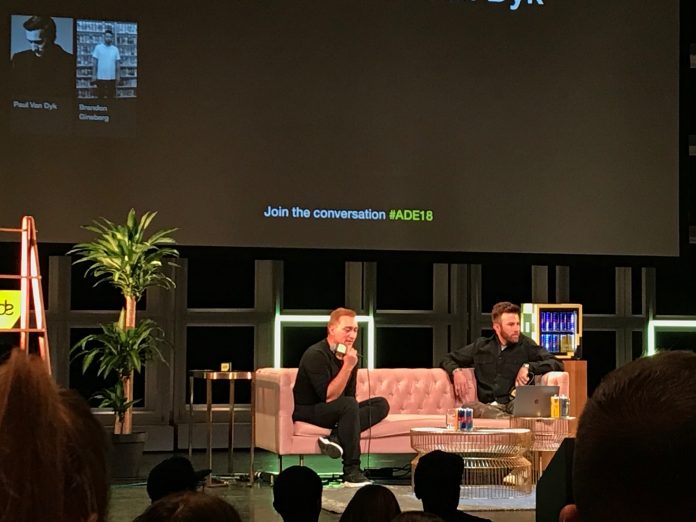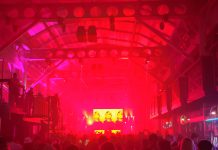Paul Van Dyk was one of Wednesday’s main attractions. At the Del Mar Theater, this was a lush auditorium, but oddly only about half full. Paul was soft spoken and polite during the talk, which was full of sadness and love.
(As interviewed by Brandon Ginsberg of Red Light Management)
Brandon wasted no time asking the all important question: What did it take to bounce back from the tragic fall?
Paul stated that he doesn’t remember that much, that his brain just “put it somewhere.” His physician recommended that he never see the video of the fall, as it would bring the tragic memory to the forefront. He was in a coma right away after the fall.
He stated that he was lucky that the accident happened in Utrecht because they have a neurological unit at the hospital and he was treated right away. He was then hospitalized for 9-10 days in the ICU in Utrecht and 4 months overall. He wanted to go home, and tried his best to go back to Berlin.
He told us that he had a reason to fight – his family. They helped with his recovery so much, as it was too much to go through alone. He never heard anything from the folks where he fell. “No calls. No fucking way.”
What did it take to come back to music and performing?
Lots of therapies. He had to learn how to speak, eat, and move. He felt that EDC was a safe environment to come back to, and they had ambulances standing by for him during his performance. He had to test the environment before he was safe to come back: flashing strobe lights and loud music. He stated later in the interview that he would not have been able to pay for some of the treatment if he was not so well off. Even though he had amazing doctors in The Netherlands and Germany, he still had to go to expensive doctors in the US. He later quipped that if he hadn’t fallen, then the camera guy would have.
For production, it took a long time for him to go to the computer to switch it on. He was so scared of not being able to make music again and it would be time to go back to his old life. That music became his new album, This is Life. When asked what was the main thing that made him go back, he stated that he was told that routine would help his recovery, and his routine was making music. Making the album in a sense helped his recovery.
The production companies and promoters have a responsibility for the safety of the guests and the artists. It’s important for it to be safe for people that attend; it’s a responsibility, even with smaller events. Limited budget is no excuse. “If you work for a contract that doesn’t play by the rules, the production company must do a good job and honor it.”
The accident changed the way he accepts shows. He can only do about 50% of the number of shows now, and the sets have shortened to 1.5-2 hours instead of 3. His manager gets everything together, including making an extra security check. He sleeps before the show, and gets a 30 minute wake up call before he has to leave.
Brandon then asked if he felt that this has made an impact on his longevity, and how long he would continue to work. Paul stated that he now has new life threatening things he has to be conscious of, but will make music until his last breath.
When asked how this affected the people around him, Paul lamented that he couldn’t explain what his wife went through and that he couldn’t say sorry enough. He is happy he is alive, but has quite a few annoying issues still.
Audience questions:
When asked if he had a favorite club or venue to play at, he said that he really didn’t have one. It depends on the night, but lots of venues have potential.
When asked a preferred method of collaboration, he stated that it was a combination of in the studio or sending the track back and forth, depending on the track. Everything was mixed at home.
When asked about sampling, he stated that he doesn’t really use samples to get the ball rolling. He doesn’t care if other people use it if it’s a great and inspiring piece of music.
This content has been edited for brevity and recreated from notes taken during the talk.
Journalist/blogger since 2009 and music lover since 1980. Bex now travels the world and writes and takes photos of dance events, creates art in various media, sings quietly to her cat in the shower, and occasionally builds something that tends to involve a blowtorch. She can usually be seen hiding behind some sort of camera rig.





